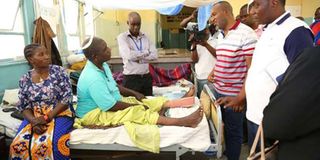Cancer unit to be set up in Mombasa

Mombasa governor Hassan Ali Joho and Kisauni MP Rashid Bedzimba visit patients at Coast General Hospital in Mombasa on August 16, 2015. PHOTO | LABAN WALLOGA |
What you need to know:
- Only one oncologist from KNH treats patients at the Coast once a month.
- Centre expected to be finished in three months and will save patients trip to city.
The Coast General Hospital in Mombasa will have a cancer unit in the next three months.
According to Mombasa Governor Hassan Ali Joho, the unit will cost Sh7 million.
He said the centre, the first of its kind in the region, would provide radiotherapy and other cancer treatments.
He was speaking during the launch of a Sh335 million drive to improve maternal and child health in Mombasa slums by the European Union and its partners at the Treasury Square last week.
ONE ONCOLOGIST
Currently, cancer patients at the Coast travel to Kenyatta National Hospital (KNH) in Nairobi for treatment.
“The cancer unit at the Coast General Hospital will be ready in the next three months,” said Mr Joho.
According to records at the oncology clinic at the hospital, there are 600 diagnosed cancer cases.
The clinic relies on one oncologist from KNH, who comes to treat the patients once in a month.
The governor invited European Union officials for the opening of the cancer unit.
At the same time Mr Joho thanked EU for funding the slum maternal health project.
“This project would help to significantly reduce the number of deaths of mothers and children,” said Governor Joho.
FAMILY PLANNING
Mombasa Women Representative Mishi Mboko said it is important for families to practice family planning to alleviate illnesses brought on due to lack of nutritious food.
The county government, in collaboration with German Foundation For World Population, Women and Heath Alliance International, Danish Red Cross will jointly implement the slum project.
The team will focus on women and children in Bangladesh, Maweni, Junda, Kaa Chonjo and Machafukoni slums.
The programme includes family planning, antenatal care, and the training of birth attendants as well as post-natal care of mothers.
Equipment and supplies that support maternal and child health in the slums would be procured.
The partners are also expected to strengthen referral mechanisms through use of technology, promote access to safe motherhood by encouraging medical seeking habits and enhancing family planning awareness in the slums.





